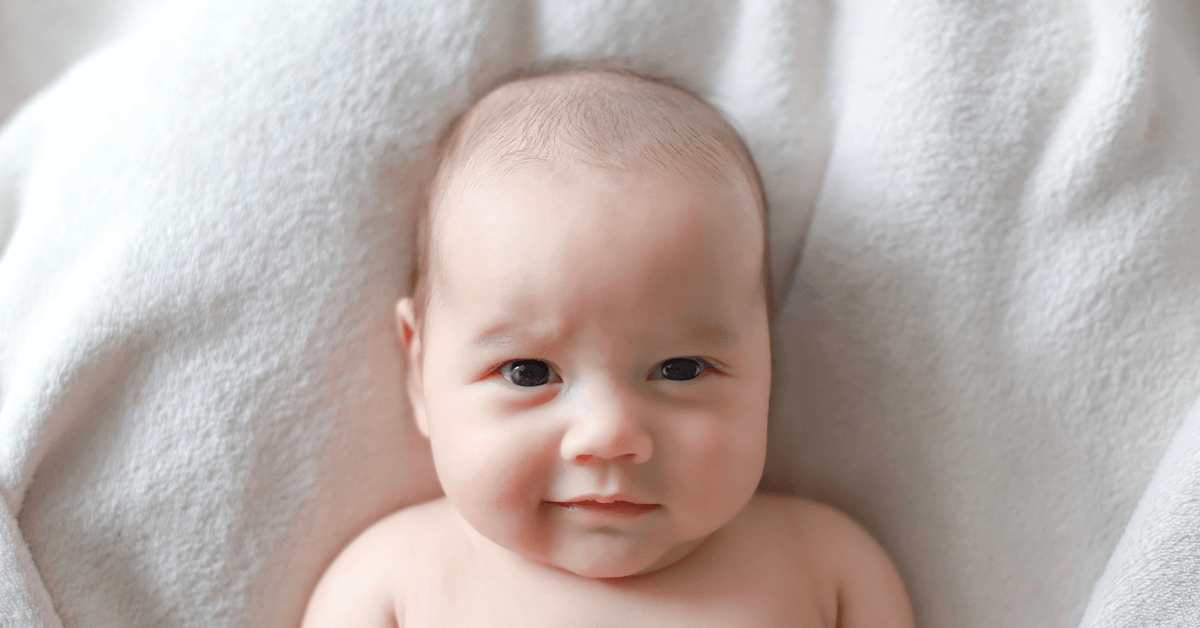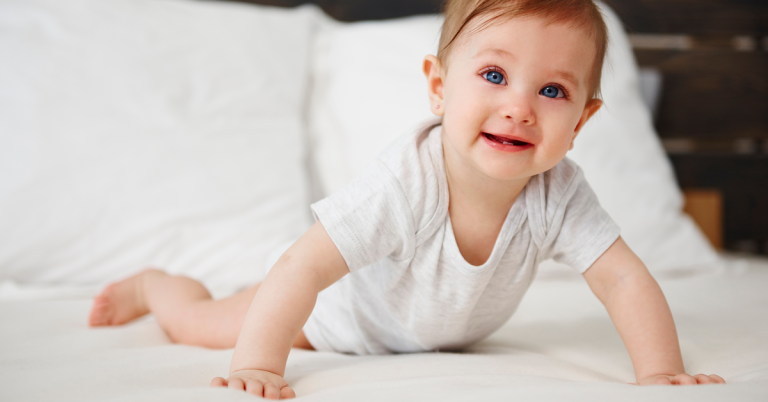What Does a 2-Month-Old Baby Do?
- He can respond to your smile with a smile.
- At 1.5 months, he reacts to the rattle in a certain way. (scared, silent, crying)
- Can make sounds other than crying.
- He can raise his head 45 degrees on his stomach.
- When sitting upright, he can hold his head upright.
- He can lift his chest off the ground with the help of his arms when he is on his stomach.
- It can be rolled over.
- Can pay attention to small objects.
- He can grasp the toy when the toy is placed on his fingertips.
- It can reach for an object.
- Can form words with consonants, such as age.
- He starts laughing by himself.
- He can clasp both hands.
- It can scream of joy.
- It can follow an object within 15 cm of its face 180 degrees (from side to side).
2-Month-Old Baby Nutrition
If you are on maternity leave during these months, remember that you should breastfeed your baby as much as possible. Breast milk that you will give him until the age of 2 and breastfeeding your baby directly when you are not working will strengthen the bond between you and increase your milk supply.
If you are wondering about the feeding frequency of a 2-month-old baby, we can say that you should feed every 2-3 hours. However, we recommend that you breastfeed whenever you want so that your baby does not experience breast rejection and gets as much breast milk as possible. Of course, by paying attention to your fatigue, remember that the better you are, the better your baby will be.
If you are going back to work, you may need to stock up on breast milk while breastfeeding your baby during this period. For this reason, it is precious to take care of yourself, to support your milk with foods that increase breast milk and with a healthy diet.
As the baby suckles, milk comes in, and the receptors on the nipple are stimulated. For this reason, the baby should be breastfed frequently.
What to Do in Case of Fever?
Many things can cause a fever in your baby. When this happens, you first need to observe your baby well. When a baby under three months of age develops a fever, you should always consult a doctor as soon as possible, as there is a high risk of febrile convulsions. Never give your baby any medicines without consulting with your doctor first. Suppose your baby continues to feel uncomfortable, even if the fever has decreased. In that case, we recommend that you also consult with your doctor. After three months, depending on the duration and height of the fever, you may wait a little longer before taking your baby to the doctor.
How Much Does a 2-Month-Old Baby Suck?
Now, “How many ccs of milk does a 2-month-old baby drink?” We know you’re wondering the question. The stomach size of a 2-month-old baby is almost the size of a walnut. For this reason, he gets full very quickly and gets hungry very quickly. Do not let this question occupy your mind. You do not need to calculate during this period. Feed your baby a lot.
If your baby cannot take breast milk for various reasons if you are supplementing with formula, “How many cc of formula does a 2-month-old baby drink?” The person who will answer the question is your doctor, who monitors your baby’s development.
How Much Should a 2-Month-Old Baby Have?
A 2-month-old baby boy weighs 5400 grams on average, and a 2-month-old girl weighs an average of 5000 grams.
How many cm should a 2-month-old baby be?
- 2-month-old baby girl height lower limit: 52
- 2-month-old baby girl height upper limit: 62
- 2-month-old baby boy height lower limit: 53
- Maximum height of a 2-month-old baby boy: 63
2-Month-Old Baby Vaccinations
We can say that two months is a period when your baby is a little busy in terms of vaccinations.
For your 2-month-old baby, the combination vaccine is given for five diseases. These diseases are:
- Diphtheria
- whooping cough
- tetanus
- Poliomyelitis
- Hemophilus Influenza B (a virus that causes meningitis-pneumonia-middle ear inflammation). The combination vaccine is administered as a single injector.
In addition, BCG (TB) Vaccine is given.
How Much Should a 2-Month-Old Baby Sleep?
In the first months, your baby can sleep for an average of 12-16 hours. In the newborn period, even if this is not distinguishing between day and night, the average sleep of a 2-month-old baby is 14 hours, and they spend most of it at night.
This month, your baby can sleep three times in a row. You can prepare sleep routines such as massage and fairy tales to prepare your baby for a long sleep, especially at night.
How Should 2-Month-Old Baby Care Be?
How Do You Know When Babies Are Cold?
One of the mothers’ most significant mistakes is dressing their baby too thickly. Although it changes according to the season, keeping your baby at the appropriate temperatures is sufficient. You do not need to keep it in a scorching environment. For this, our advice is to thicken your baby by dressing them in thin coats. This way, you can easily take it off when you feel it sweating.
You can’t tell by the hands that the baby is cold. You can tell by touching the clothed parts of it.
Can a 2-Month-Old Baby Be Taken Out?
When you bring it home from the hospital, you take your baby out. After that, you can take your baby outside as long as it is not cold. The view of previous generations not to let the baby out of the house for two weeks after birth is entirely invalid now. A tough baby to come home from the hospital can also be taken to the park or supermarket. However, if there is a flu epidemic, it is better not to take your baby out.
Do not forget that the most effective way to protect your baby from infectious diseases is to have the clean hands of the people who care for him. Be very careful with handwashing. Dress your baby appropriately when going out and take spare clothes for sudden weather changes. Limit your baby’s time outside in rainy and windy weather. Wear your baby’s headgear to protect them from the sun in the summer and the cold in the winter.
Baby Ear Care
Clean the outside of your baby’s ears with a washcloth or cotton, but do not insert fingers, cotton, cotton buds into the ear canal. The ear can naturally clean itself, and removing dirt with any material will do nothing but push the ground deeper. If there is an excessive accumulation of land, it means that your baby may have an infection in his ear. In this case, talk to your doctor.
Baby Health and Development Review
The approach of each doctor or nurse to healthy baby control may be different. The general organization of the physical examination and the type and number of examination techniques are tailored to the infant’s individual needs. However, in general, the following should be done in the two-month baby routine examination:
- Questions about the baby’s situation and his family at home, how the baby is fed, sleep patterns and general development are examined.
- The baby’s weight, height, head circumference are measured and marked on the development chart from birth.
- If there is a pre-existing problem, it is checked.
- Study of its development. Head control (can he hold it upright?), hand use, vision and hearing skills, social interactions can be tested
- The first vaccination sessions are done.
- It is explained what can be done in the next month regarding nutrition, sleep and development.
- If necessary, suggestions can be made about fluorine support and vitamin D.
- You will be informed about the side effects of the vaccines given to the baby and when to call your doctor.
It’s Your Turn Now – Write a Comment
How are you raising your 2-month-old baby? What challenges did you experience? How did you overcome them? We welcome your comments so that other caregivers can learn.
Don’t Forget to Share!
Don’t forget to share our 2-month-old baby development article so other caregivers and expectant parents can read and learn!







